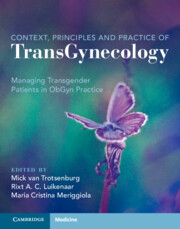Book contents
- Context, Principles, and Practice of Transgynecology
- Context, Principles, and Practice of Transgynecology
- Copyright page
- Dedication
- Contents
- Foreword
- Preface
- Contributors
- Abbreviations
- Section A Contextual Transgynecology
- Chapter 1 Terminology in Transgender Medicine
- Chapter 2 Optimizing Clinical Ob/Gyn Services through Improved Communication with Trans Persons
- Chapter 3 What Do Trans People Expect from Transition and What Do They Encounter Physically?
- Chapter 4 A Pondering Trans Female Gynecologist
- Chapter 5 The Ever-changing Role of the Mental Health Care Professional in Transgender Healthcare
- Chapter 6 Impact of Stigma and Resilience on the Health of Transgender and Nonbinary People
- Chapter 7 Dealing with Health Needs and Physical Complaints of Nonbinary Clients
- Chapter 8 Gender is So Much More: Impulses for a Gender-variant Gynecological Expertise from a Queer-theoretical Perspective
- Section B Practicing Transgynecology
- Section C Gynecological Surgery for Transgender Males
- Section D Sexuality and Contraception
- Section E Fertility and Reproduction
- Section F Impact of Gender-affirming Hormonal Therapy on Genital Organs
- Section G Screening and Prophylaxis
- Transgynecology Index
- References
Chapter 3 - What Do Trans People Expect from Transition and What Do They Encounter Physically?
from Section A - Contextual Transgynecology
Published online by Cambridge University Press: 22 December 2022
- Context, Principles, and Practice of Transgynecology
- Context, Principles, and Practice of Transgynecology
- Copyright page
- Dedication
- Contents
- Foreword
- Preface
- Contributors
- Abbreviations
- Section A Contextual Transgynecology
- Chapter 1 Terminology in Transgender Medicine
- Chapter 2 Optimizing Clinical Ob/Gyn Services through Improved Communication with Trans Persons
- Chapter 3 What Do Trans People Expect from Transition and What Do They Encounter Physically?
- Chapter 4 A Pondering Trans Female Gynecologist
- Chapter 5 The Ever-changing Role of the Mental Health Care Professional in Transgender Healthcare
- Chapter 6 Impact of Stigma and Resilience on the Health of Transgender and Nonbinary People
- Chapter 7 Dealing with Health Needs and Physical Complaints of Nonbinary Clients
- Chapter 8 Gender is So Much More: Impulses for a Gender-variant Gynecological Expertise from a Queer-theoretical Perspective
- Section B Practicing Transgynecology
- Section C Gynecological Surgery for Transgender Males
- Section D Sexuality and Contraception
- Section E Fertility and Reproduction
- Section F Impact of Gender-affirming Hormonal Therapy on Genital Organs
- Section G Screening and Prophylaxis
- Transgynecology Index
- References
Summary
Trans people who transition medically are typically hoping to live their lives simply as members of the sex with which their gender corresponds but may wish to make full use of the capabilities of their physical bodies, which may differ from typical male or female bodies. This chapter, co-authored by a trans man who is a transgender health advocate and a trans woman who is a physician, provides an overview of the kind of physical changes that are experienced by trans people, both those who transition from female to or toward male and those from male to or toward female, and alerts gynecologists and other medical healthcare professionals to the trans person’s perspective in clinical encounters.
Keywords
Information
- Type
- Chapter
- Information
- Context, Principles and Practice of TransGynecologyManaging Transgender Patients in ObGyn Practice, pp. 19 - 25Publisher: Cambridge University PressPrint publication year: 2022
